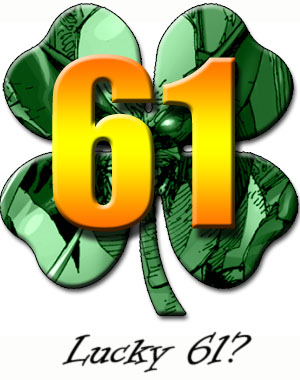
Aristotle wrote, “I know more than any man knows because I know that I do not know.” During my doctoral studies, I began to learn that the most educated people often lack answers to tough questions. They do, however, understand which questions to ask. Being great at this game is not about knowing the answers, it is about learning which questions to ask and attempting to solve problems of weakness.
Lost: More Than a Show on TV
Most players start this game with the basics. They grab a deck, and a set of rules or a coach, and they struggle through a massive amount of reading, playing, and watching before the light of understanding begins burning brighter. There is a sharp learning curve in this game. Learning the basics may be somewhat challenging, but marked improvement can prove a Herculean task.
Teach a new player how to negotiate the phases, use resources, recruit characters, and resolve battle damage (or watch such a player being taught); people generally stare blankly. Krispy Kreme donuts could never apply a glaze like that found in a new player’s eyes while he or she attempts to process the inaugural explanation of priority and the chain. It’s a lot of information, and players can get lost.
The Superstitious Pigeon
When you train animals such as pigeons or rats in the successive steps of a task, it is important to offer immediate feedback for successful attempts at each step, or immediate correction for errors. In psychology, we call these attempts at learning successive steps learning trials. Learning trials can be pretty smooth or be the proverbial train wreck. The reason that we can use animals in learning research is that the basic rules for learning are universal. Therefore, the most effective strategies for learning can be applied to a myriad of situations.
I once taught a pigeon how to be superstitious. In the lab there were some little bird coops with buttons. The goal was to make the pigeon hit some buttons and learn to beat or tie a graduate student in a game of tic-tac-toe.

Some of you may have experienced firsthand the discomfort of being smoked at a game of tic-tac-toe during a visit to the state fair. Well, this is the magic behind the clever chickens. Learning trials are used to teach the chickens to hit a given sequence of buttons. You might think of it as an advanced “pecking order” of sorts. Generally, you begin by rewarding a bird with some sort of food when it approximates the behavior that makes up the first step of the chain of steps comprising the total behavior. For example, a bird may walk toward the red “X” button. The trainer delivers food, and after a couple of trials, the bird begins to figure out that food may be delivered when it walks to the given button. Once it gets the basic concept of the first step, then you begin rewarding the bird for not only walking toward the red button, but also then walking over to the green button. Eventually, you can get an animal to complete a series of discrete behaviors that comprise your desired outcome.
The problem with these learning trials arises when the bird gets a reward when it was not supposed to be rewarded or if it achieves the food pellet after doing an unexpected behavior. My superstitious pigeon got a little piece of food every time it walked over to a certain trigger. One time, it did a 360-degree turn before it got the reward, and from that time on, the misguided bird “believed” that it had to do the pirouette before getting the feed. Not only had I taught my bird to move toward the trigger, but I also had it dancing.
The Dancing Bird Problem
 That was not just a useless non-sequitur. The dancing bird problem (the establishment of superstition) is a serious concern for most gamers. I have met, taught how to play, and played with a number of players. Inevitably, these players have developed their own theories on character stats, card counts, and just about every aspect of the game that you can think of. Has anyone ever played with a decklist sporting 61 cards? This is never done out of necessity, it is never done because it helps with the statistical likelihood of drawing a given card or card type, and it is almost always a weaker choice than playing 60 cards.
That was not just a useless non-sequitur. The dancing bird problem (the establishment of superstition) is a serious concern for most gamers. I have met, taught how to play, and played with a number of players. Inevitably, these players have developed their own theories on character stats, card counts, and just about every aspect of the game that you can think of. Has anyone ever played with a decklist sporting 61 cards? This is never done out of necessity, it is never done because it helps with the statistical likelihood of drawing a given card or card type, and it is almost always a weaker choice than playing 60 cards.
Some of the best players in this game cling to the notion that there is something advantageous or even lucky about 61 cards. A few victories, and we have a number of dancing birds. Most players are working off of a trial-and-error type of paradigm in which we talk tech, insert tech, and generate some opinion on how the tech worked. There is a scientific way of analyzing data, and then there is the more common way of making decisions.
Example:
Teammate 1: Man, I am really struggling with how many copies of (secret tech card) to run in this Teen Titans build we’re taking to the PC.
Teammate 2: Yeah, my list of 60 cards just has no extra room.
Teammate 3: I won a whole bunch of tournaments with a Teen Titans deck packing 61 cards.
Teammate 1: Wow! You made money with 61 cards?
Teammate 3: I heard that Calabrese guy played 61 cards in his PC deck.
Teammate 2: We should all run 61 cards!
In this semi-fictitious example, we have a discussion that leads to the dancing bird problem. Superstitions are established because of the presence of successful outcomes. For some reason, humans have a tendency to attribute the cause of success to the presence of some external factor. I played sports in high school and college, and hung around with tons of guys that carried lucky charms, put a shoe on the left foot before the right foot on game day, or refused to eat before a match.
There is nothing special about the lucky charm. The order in which your shoes go on your feet has nothing to do with the outcome, and that bird did not have to turn circles before it got to eat.
Turn Circles FTW
Vs. System has a great deal of complexity, and while learning a game of such complexity, it is likely that many players will receive a positive outcome despite making a huge mistake. This may “teach” the players that they should continue to make such plays. In the end, we can sit down at a PC with some pretty serious bad habits.
Beginning players receive less feedback and often have less practice than most pro players; there is a reason that players find success with a team. Teams offer a chance for brainstorming and the pooling of resources, but they also offer a structure for feedback and immediate correction—things that beginning players, like the pigeons, need in order to learn successfully. Playtesting in groups of 3-4 can really help hone a player’s skills. There are multiple opinions and sets of eyes to offer suggestions or critiques of play errors in formation, attacks, card usage, etc.
I have improved the most from the suggestions and corrections offered by players that know the right questions to ask. When you begin playing, trial-and-error practice alone may not be enough to improve your skills to the PC championship level. Most players do not catch the majority of their own mistakes, and it is rare that you find an opponent that takes the time or effort to point out the mistakes that just cost you the game.
Therefore, those players around you are your best chance to get feedback and pose questions. At this point in the course, we have talked about ways to make scientific decisions, we have covered tools that may allow us to make such decisions, and we have talked about some important theoretical aspects that should be considered. The application of these skills in a situation that offers feedback and correction, however, will improve the chances that you learn to implement them.
Learning Trials, Superstition, and Making the Right Decisions
In college, I had a number of professors that claimed education was about learning to learn. In a way they were right. There is a way in which the best learners establish a process that makes learning effective and efficient. This economical accuracy becomes especially important when applied while learning the most difficult tasks.
This appears to be the major difference between those who find success and consistency in this game, and those who fail or luck into some victories. Effective playtesting and card evaluation are the backbone of strong performance. If you are making poor choices, there is a good chance that you have failed in one of these aspects. In the last Pro Circuit, our team did not field a single deck; we did not make a clear choice between two decklists. One of the decklists was clearly superior (hindsight approved!), while the other was less optimal. It is likely that more effective playtesting and information analysis would have improved the outcome for our team.
At the beginning levels, the learning curve is sharp, but we ultimately face many of the same challenges as seasoned professional players. We have to negotiate new situations and new decks, and we need effective learning trials. Taking a weak or “wrong” deck to an event is a form of superstition. If you have ever fielded the wrong deck in a format or chosen a deck that bombed, you may have made the same mistakes as my dancing pigeon.
To avoid these problems, find the best possible team or playtest group. Pool your information, and talk about the strategies best suited to play each deck and possible opposing decks. Some teams have players that are more “stall” or “aggro.” I have heard players talk about being best with aggressive decks or performing better with curve decks. Those comments are indicative of a need for growth. Every deck has tempo and decision rules; figuring out the rest requires practice and that corrective feedback. Eventually, you will be able to generate the best information.
Class dismissed.
Jeremy “Kingpin” Blair (7-drop, TAWC) is a card flipper and student of the game from the Southeastern part of the United States. If you have constructive comments or questions, feel free to contact him at Tampakingpin@yahoo.com.